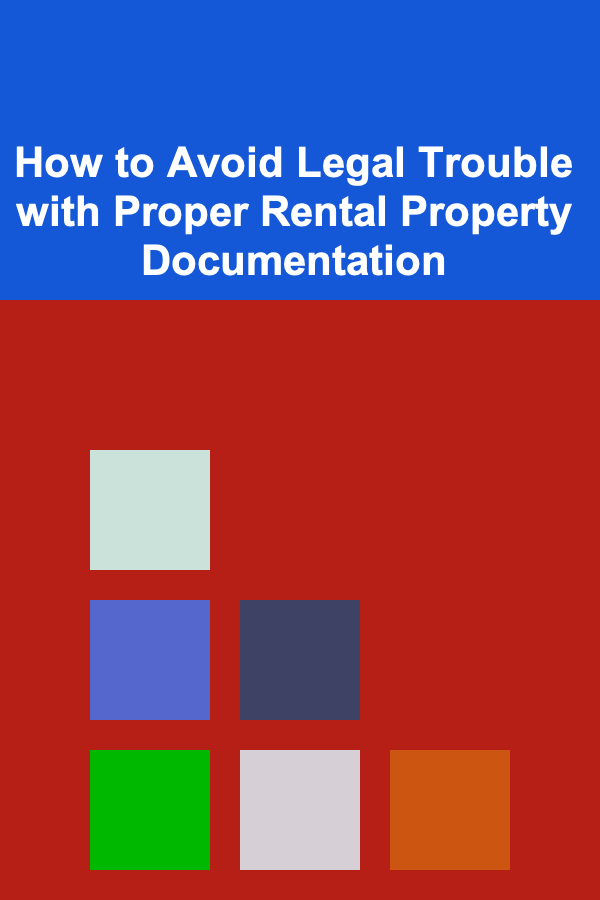
How to Avoid Legal Trouble with Proper Rental Property Documentation
ebook include PDF & Audio bundle (Micro Guide)
$12.99$8.99
Limited Time Offer! Order within the next:

Managing rental properties involves more than just keeping track of rent payments or ensuring the property is well-maintained. One of the most crucial aspects of property management is proper documentation. Without well-documented records, landlords can find themselves embroiled in legal disputes, facing hefty fines, or even losing their property. Having the correct paperwork in place can protect both the landlord and the tenant, ensuring that everyone knows their rights and responsibilities and reducing the risk of legal trouble.
In this article, we will explore how proper rental property documentation can help avoid legal issues, focusing on key documents that landlords should maintain, best practices for document management, and how to protect themselves legally in various situations. By the end of this article, you will understand the critical role documentation plays in rental property management and how to handle it effectively to avoid potential legal pitfalls.
Why Proper Documentation is Important
Legal disputes in rental property management often arise due to misunderstandings or unclear terms. Proper documentation acts as the primary tool to clarify the relationship between landlords and tenants, setting expectations and providing evidence should a dispute occur. Some of the most common situations where documentation plays a vital role include:
- Lease or Rental Agreement Disputes: When there is a disagreement over terms such as rent payment, lease duration, or property use.
- Eviction Cases: Clear records of violations, payments, and communications are necessary to justify eviction proceedings.
- Security Deposit Refunds: Documentation of the condition of the property before and after the tenant's occupancy ensures fairness in returning security deposits.
- Property Damage Claims: Written records of damages or repairs help prevent confusion and disputes about the state of the property.
- Compliance with Local Laws: Rental laws vary by location, and maintaining proper documentation helps ensure compliance with these laws to avoid fines or lawsuits.
By maintaining thorough and organized documentation, landlords can not only avoid legal trouble but also foster a professional, transparent, and trustworthy relationship with tenants.
Essential Rental Property Documents
While there is no one-size-fits-all list of documents for every landlord, there are certain key pieces of documentation that can prevent many common legal issues. Let's look at the most important documents that landlords should keep.
1. Rental Application
A rental application is the first step in determining whether a prospective tenant is suitable for your property. This document typically collects information such as:
- Full name, contact details, and social security number
- Employment history and income verification
- References from previous landlords
- Criminal history and credit checks
By thoroughly reviewing the rental application, landlords can make informed decisions about the tenants they allow into their properties. However, landlords should ensure they comply with fair housing laws when processing these applications and avoid discrimination based on race, religion, gender, disability, and other protected categories.
2. Lease or Rental Agreement
This is the most important document in a rental relationship. A lease or rental agreement outlines the terms and conditions of the rental, setting expectations for both the landlord and the tenant. It typically includes the following:
- Duration of the lease (monthly, yearly, etc.)
- Rent amount, payment due dates, and late fee policies
- Security deposit amount and refund policies
- Rules for pets, smoking, noise, and other property-related regulations
- Maintenance responsibilities for both parties
- Consequences for breaking the lease or violating the terms
It is crucial that the lease agreement is clear, unambiguous, and in compliance with local laws. Both parties should sign it before the tenant moves in, and each party should keep a copy. This document can be a powerful tool in court if disputes arise, as it provides clear evidence of the agreed terms.
3. Move-In/Move-Out Inspection Checklist
One of the most common sources of disputes between landlords and tenants is the condition of the rental property. To prevent confusion, landlords should always conduct a move-in and move-out inspection. A checklist should include:
- Detailed descriptions of the property's condition, including pictures or videos of each room
- Any pre-existing damages or issues
- Appliance and fixture functionality
- Cleanliness of the property
This checklist should be signed by both the landlord and tenant at the time of move-in and move-out. It serves as a record of the property's condition, which can be used to justify or dispute security deposit deductions for damage repairs.
4. Rent Receipts and Payment Records
Rent payments are the primary source of income for landlords, and keeping accurate records of each payment is vital. A rent receipt should be provided every time the tenant makes a payment, detailing:
- The amount paid
- The date of payment
- The rental period covered by the payment
- The payment method (check, cash, bank transfer, etc.)
These records serve as proof of payment and can protect both the landlord and tenant in case of disputes about missed or late payments. Additionally, if the rent increases over time, landlords should maintain documentation showing the agreed-upon changes.
5. Notices of Rent Increase or Lease Changes
In most places, landlords are required to provide written notice before increasing rent or making any changes to the lease agreement. This document should include:
- The amount of the rent increase or specific lease changes
- The date on which the increase or change takes effect
- Any required notice period as specified by local laws
These notices should be served within the timeframe required by law, usually 30 or 60 days before the changes take effect. Keeping these documents ensures the landlord is in compliance with local laws and can avoid potential legal disputes over rent increases.
6. Maintenance and Repair Requests
Documenting all maintenance and repair requests is vital to protect the landlord in case of damage claims or disputes. Tenants should submit maintenance requests in writing, and landlords should respond with the steps they will take to address the issue.
A paper trail of repair requests and completed work helps clarify the tenant's responsibilities for maintenance and the landlord's obligations. Keeping records of completed repairs, including receipts or invoices from contractors, can also be useful in defending against tenant claims of negligence or failure to maintain the property.
7. Notices of Lease Termination or Non-Renewal
When a lease is coming to an end or the landlord decides not to renew it, formal written notice must be given. The landlord must specify:
- The date the tenant needs to vacate
- The reason for lease termination (if applicable)
- Any steps the tenant must take, such as returning keys or cleaning the property
The notice period for lease termination varies by location, but it is typically between 30 and 60 days. This document serves as proof that the tenant was properly notified and can avoid disputes about the lease's expiration.
8. Eviction Notices
In the unfortunate event that an eviction becomes necessary, landlords must follow a legal procedure, including providing proper eviction notices. There are several types of eviction notices:
- Pay or Quit Notice: Used when the tenant has failed to pay rent.
- Cure or Quit Notice: Used when the tenant has violated lease terms.
- Unconditional Quit Notice: Used for serious or repeated violations.
The notice should clearly state the reason for eviction, the time the tenant has to rectify the situation or vacate the property, and any other pertinent details. Once the notice is served, landlords can begin legal eviction proceedings if the tenant does not comply.
9. Correspondence and Communication Records
Every time a landlord and tenant communicate---whether by phone, email, or in person---there should be a record of it. This can include:
- Written communication such as emails, texts, and letters
- Notes on phone conversations, including the date, time, and key points discussed
- Any informal agreements or promises made
Maintaining a log of communication helps resolve disputes by providing a clear record of what was discussed or agreed upon, which can be crucial in case of a legal dispute.
Best Practices for Managing Rental Property Documents
Now that we've discussed the essential documents needed for rental property management, here are some best practices for managing those documents:
1. Keep Documents Organized
Organizing rental property documents is essential for easy access when needed. Create a filing system that includes both physical and digital copies. Use folders or binders for physical documents and cloud storage or document management software for digital ones. Be sure to organize documents by property and tenant to prevent any mix-ups.
2. Stay Compliant with Local Laws
Landlord-tenant laws vary by jurisdiction. Stay informed about the legal requirements in your area, including those related to rent control, lease terms, eviction procedures, and fair housing laws. Consulting with a local attorney or property management professional can help ensure you are complying with all relevant regulations.
3. Secure Your Documents
Tenant information is private and sensitive. Use secure systems to store and manage documentation to prevent unauthorized access. For example, digital documents should be encrypted and backed up regularly, and physical records should be kept in a locked, secure place.
4. Use Professional Services
If managing documentation feels overwhelming, consider using property management software or hiring a professional property manager. These tools and services can help streamline document organization, automate processes, and ensure compliance with local laws.
5. Regularly Review and Update Documents
Ensure that your rental agreements and other documents are up to date. As laws change or as you update property policies, review and revise your documents accordingly. For example, if new local rent control laws are passed, make sure your lease agreements reflect these changes.
Conclusion
Proper documentation is one of the most powerful tools in avoiding legal trouble in rental property management. By maintaining organized, thorough, and legally compliant records, landlords can protect themselves against disputes, claims, and lawsuits.
From rental applications and leases to maintenance records and eviction notices, each document serves as a safeguard to clarify expectations, fulfill legal obligations, and provide evidence when disputes arise. By following the best practices for managing rental property documentation and staying informed about local laws, landlords can maintain smooth, efficient, and legally sound rental operations.
In the end, good documentation is more than just a way to avoid legal trouble; it is a key factor in building a professional relationship with tenants and creating a transparent, fair, and trustworthy rental experience for all involved.
Reading More From Our Other Websites
- [Trail Running Tip 101] From Solo to Duo: Turning Your Solo Trail Runs Into Fun Friend Challenges
- [Home Pet Care 101] How to Socialize Your Puppy or Kitten Effectively
- [Home Rental Property 101] How to Handle Tenant Complaints Professionally and Efficiently
- [Home Soundproofing 101] How to Soundproof a Home Using Green and Sustainable Materials
- [Organization Tip 101] How to Archive Past Volunteer Projects for Reference
- [Small Business 101] How to Build a Zero‑Waste Supply Chain for a Boutique Coffee Roastery
- [Whitewater Rafting Tip 101] Best Whitewater Rafting Expeditions: Exploring Remote & Uncharted Rivers
- [Paragliding Tip 101] The Ultimate Paragliding Travel Packing List: Essentials for Every Pilot
- [Simple Life Tip 101] Best Budget‑Friendly Hobbies That Promote a Calm, Simple Life
- [Personal Investment 101] How to Use an Investment Calculator to Forecast Your Financial Future and Set Realistic Goals

How to Arrange Furniture for Flow in Tight Spaces
Read More
How to Create a Family Travel Organization System
Read More
How to Evaluate Different Financial Advisor Budgeting Approaches for Your Goals
Read More
How to Transition to Open Office Spaces Smoothly
Read More
How to Use a Filing System for Paperwork Management
Read More
How to Use Social Media to Sell Your Handicrafts and Increase Sales
Read MoreOther Products

How to Arrange Furniture for Flow in Tight Spaces
Read More
How to Create a Family Travel Organization System
Read More
How to Evaluate Different Financial Advisor Budgeting Approaches for Your Goals
Read More
How to Transition to Open Office Spaces Smoothly
Read More
How to Use a Filing System for Paperwork Management
Read More